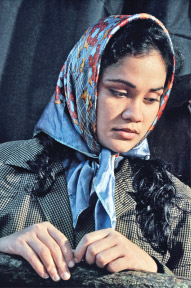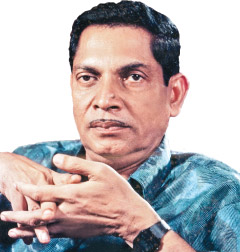|

IMAGINE! inside Irkutsk
Sachitra MAHENDRA
One of the first playwrights to have an audience in the West, Alexei
Arbuzov penned a number of plays. ‘It Happened in Irkutsk’ was his most
successful play. Set up in a labour working field, the plot progresses
as different types of bonds gradually grow among the labourers. Arbuzov
weaves the plot, driven by Communist ideals, giving emphasis to the need
of an idealist society. Ranjith Dharmakeerthi, whose Sinhala production
came alive in the late 1970s as ‘Angara Ganga Gala Basi’, brings in a
fresh production to reinterpret Arbuzov.
Q: How do you link Alexei Arbuzov’s Russian philosophy on the
local society?
A: Arbuzov appears in the middle of the 20th century. This is
when Russians were gradually experiencing the advent of film and
television.

So he had to cater to an audience with advanced taste buds. Just like
his contemporaries, Arbuzov had to work on new techniques and strategies
on stage play.
At the same time he could witness a downfall of the society.
Technology was developing but the morals were flowing on the reverse.
The society needed a great human being. Simply speaking, Arbuzov
hoped for a better communist set up.
His challenge was to fuse this thinking into his work without letting
the audience get bored. He overcame it by giving emphasis to human
relationships.
 |
|
Angara Ganga Gala Basi new production
Ranjith Dharmakirthi’s
2013 production of ‘Angara Ganga Galaa Basi’ will be staged
at the Lionel Wendt on February 27 and 28 at 6.30 pm |
The play takes place in a working field. There are filial
relationships. Some in fact fall in love with each other. We had a
similar environment in the 1970s.
Most plays were focused on conveying the message more than the
aesthetic quality. That’s why I wanted to have Arbuzov’s on the local
stage.
Q: You stayed off the stage for a long period. Why?
A: First the stage was no longer the place for classical
literature. Second, the proper appreciation got lost.
Third, actors were leaving us for the television. So I could not see
any reason to stay on the stage any more.
Q: Are you happy with the today’s theatre culture?
A: Not really. But we can see positive features. My friend
Jayalath Manoratne said a considerable crowd is coming to watch stage
plays.
That means one thing. Even despite this high technology, people still
have patience to come to a theatre and watch for an hour or two. That’s
a good thing.
In fact I recommenced ‘Angara’ project because of Prasannajith
Abeysooriya’s continuous request. He was quite positive that we could go
a long way.
Q: And why ‘not really’?
A: Mainly because I do not think all the plays are good
enough. They lack depth. Holistically I cannot be happy with today’s
drama culture.
Q: Any modifications to the 2013 production?
A: Of course, yes. The society is different. I have given
different interpretations. It is sort of experimental. But the text
remains same. So is Maestro Khemadasa’s music. Apart from that, this
production has a fresh cast. Some actors are chosen from the ‘Kavitha’
programme. I started this as a three-month workshop.
Q: With more sophisticated media such as television and film,
do you think stage drama will flourish?
A: It will, as long as it is alive! You cannot cheat your
audience. The audience likes it too. For instance in ‘Angara’, I have
employed Aristotelian structure, Brecht’s epic form and Greek drama
style. Sometime the audience is questioned.
At times the audience has to listen to what the cast says. You cannot
do such things on more sophisticated media.
Q: How was Maestro Premasiri Khemadasa’s music useful?
A: It was immense. He had a good command of both eastern and
western music. And above all, it was a wonderful experience. Together
with my lyricist Ajantha Ranasinghe, I used to visit the Maestro’s
place. Now this is early in the morning, the moment when his creative
mood is at its hype.
T M Jayaratne comes too and our initial practices begin.
 |
|
Ranjith
Dharmakeerthi |
Maestro murmurs alone with no interruption. The next moment he wants
Ajantha to change either a word or a line. Sometimes he wants me to
spell out the subtext.
So that was a wonderful period. I am especially grateful to the
Khemadasa family to make things easier.
We could obtain a DVD of his music thanks to Rupavahini Corporation
Chairperson Mohan Samaranayaka.
Q: You have been in the book industry in between, with your
own publishing company. Do you think the books have a better audience
than television and stage?
A: It is like this. According to a certain British research
team, 1930 saw a large attraction to the television, as it just arrived.
But it had died away over time, as it lacked the live quality of the
stage.
The standards went down. The books withstood all these trends:
television, film and so on.
I have been with my publishing company, Sakhila, for 14 years. My
experience with the BMICH Book Fair, I know the books have a fairly good
audience. |







